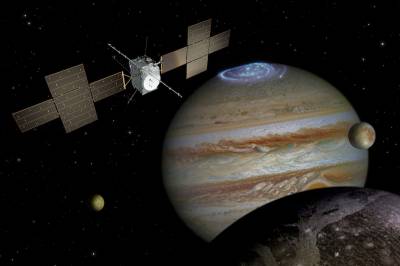Including UCL departments of Physics and Astronomy, Space and Climate Physics and Earth Sciences, and Birkbeck Department of Earth and Planetary Sciences.
Exploring other worlds through an interdisciplinary curriculum
MSc 1 year full-time, 2 years part-time

Students develop insights into the techniques used in current planetary science, and gain in-depth experience of a particular specialised research area through project work as a member of a research team. The programme provides the professional skills necessary to play a meaningful role in industrial or academic life.
The MSc is delivered in association with the Centre for Planetary Sciences at UCL/Birkbeck, with contributions from it's member departments: UCL Physics and Astronomy, UCL Earth Sciences, UCL Space and Climate Physics (the Mullard Space Science Laboratory), and the Earth and Planetary Science group at the School of Natural Sciences, Birkbeck College. The MSc includes a substantial research component, which provides opportunity to work on original research with leading planetary science, astrophysics or space science researchers at UCL and Birkbeck.
- Course structure
The programme is delivered through a combination of lectures, small-group workshops, and asynchronous content, delivered as part of the taught component. Assessment is through examinations and coursework assignments. To supplement their experience, students are encouraged to participate in subject-relevant scientific seminar series organised by the research groups within the Department. The research project is assessed through a written dissertation and an oral presentation.
The MSc in Planetary Science is a one-year (full-time) or two-year (part-time) programme requiring the attainment of 180 credits. The programme consists of a choice of six optional modules (90 credits), a research essay (30 credits) and a dissertation/report (60 credits).
A 15-credit module consists of around 150 hours of learning time, and for a lecture module typically includes 20-30 hours of contact time, plus engagement with online materials asynchronously, and personal study time.
The research-project module is 60 credits, and consists of around 600 hours personal study time alongside approximately 15-20 hours contact time.
The research-essay module (literature review) is 30 credits, and consists of around 300 hours personal study time alongside approximately 10 hours contact time.
Module selections will be subject to the approval of the Programme Director and/or MSc Tutor to ensure an appropriate workload/balance of studies throughout he programme. This is particularly applicable to part-time students.
Please note that the list of modules given here is indicative. This information is published a long time in advance of enrolment and module content and availability are subject to change.
Further information:
MSc (180 credits)
Optional Modules
Research Essay
Research Project/Dissertation
6 modules (90 credits) (30 credits) (60 credits) An extended literature survey on a topic related to your research project.
You will work on your research essay (literature review) during the first two terms (of year 2 for part-time students); the literature review is completed and submitted at the end of the second term. The research for this review lays the foundation for the research project, on which work is also started during the second term.Students start work on an individual project during the first term. This will involve attachment to any of the appropriate research groups within the Departments.
In term 3 (of year 2 for part-time students) you will focus entirely on your research project, preparing a written project report which is submitted at the end of August. You will prepare and deliver an oral presentation on your project in September.
- Projects
MSc project discussions with the MSc Tutor and potential supervisors start in October, and a project title must be defined, and a supervisor appointed, by the end of October. Project-related work begins in the first term, usually consisting of a literature survey and related background work. Progress, plans and difficulties are outlined in an initial report, due in the middle of the second term. Assessment of the project is based mainly on the final report, but other components also contribute.
Research Groups
Astrophysics Group - Department of Physics and Astronomy) Department of Earth Sciences
Department of Space and Climate Physics (Mullard Space Science Laboratory) The Department of Earth and Planetary Sciences at Birkbeck College, University of London Centre for Planetary Sciences at UCL/Birkbeck UCLO (UCL Observatory) An excellent facility for observational projects in planetary science and astronomy.
Topics
A list of previous/example projects and their supervisors/contacts:
- 'Modelling the Effect of the Solar Wind on the Structure of Saturn's Plasma Disc': This project is mainly theoretical, and aims to develop a simple numerical treatment of the 'shielding' magnetic field which arises from currents flowing at the boundary of Saturn's magnetosphere. For particular orientations of the planetary dipole, this 'shielding' field is expected to distort the planet's equatorial plasma sheet into a 'bowl-like' shape, as revealed by Cassini spacecraft observations. Knowledge of the Matlab package is an advantage, but time for learning 'the basics' will be allowed. Supervisor: Prof Nicholas Achilleos (Physics and Astronomy).
- Projects in Geophysics: Projects are offered by UCL Earth Sciences.
- Projects about Exoplanetary observation, modelling and dedicated missions: Projects are offered by: Prof Giovanna Tinetti (UCL Physics and Astronomy).
- Projects in space instruments: Projects are offered by Dr Giorgio Savini (UCL Physics and Astronomy / UCLO).
- Projects about Mars geology: Projects are offered by Birkbeck College.
- Projects about Lunar geology: Projects are offered by Prof Ian Crawford (Birkbeck College).
- Projects about Astrobiology: Projects are offered by Dr Dominic Papineau (UCL Earth Sciences) and Prof Ian Crawford (Birkbeck College).
- Projects about Observational Astronomy at UCLO: Projects are offered by Dr Giorgio Savini (UCL Physics and Astronomy / UCLO).
- 'Simulating cometary sodium tails': Comets have two main types of tail: the ion or plasma tail, composed of ions that have joined the solar wind flowing past the comet, and the dust tail, composed of solid particles accelerated away from the Sun by radiation pressure. There is a third type of tail, seen in only a few bright comets, that comprises neutral sodium atoms that are accelerated away from the Sun by radiation pressure. The strength of the anti-sunward force varies strongly as a function of the atoms' velocity component towards or away from the Sun. The project would involve the analysis of images of actual sodium tails, and the development of a computer simulation of the tails to attempt to reproduce their characteristics. Supervisor: Prof Geraint Jones (MSSL).
- Projects involving analysis of data from space missions such as Venus Express, Mars Express and Cassini. Projects are offered by Prof Andrew Coates, MSSL.
- Projects about the preparation of the PLATO space mission (ESA-M3 mission to detect new extrasolar planets). Projects are offered by Prof Alan Smith's team at MSSL.
- 'ExoMol: Molecular line lists for exoplanet and other atmospheres': With the discovery that exoplanets are ubiquitous, the emphasis Has shifted to trying to characterise them. This is done by studying molecular spectra gives rise to a major demand for laboratory data. The ExoMol project, as funded by the European Research Council (ERC), aims to provide comprehensive data on the spectroscopy of all molecules which thought to be important components of exoplanet atmospheres. This will be done by constructing, testing (against laboratory experiment) and using appropriate theoretical models for each molecule. There are a number of openings for student projects in this area: calculating molecular cooling functions, partition functions, linelists for simple (diatomic) molecules and constructing tables of experimental energy levels. The student will join a team working on this problem. Supervisor: Prof Jonathan Tennyson (Physics and Astronomy).
- 'The diagenesis of organic matter in stromatolitic carbonate': This project will involve petrographic analysis of organic matter in Precambrian stromaolites by optical microscopy. Mineral groups such as carbonates, phosphates, sulphides, oxides, phylloscilicates and others will be mapped correlatively by micro0Raman imaging to investigate their relationship with organic matter. Samples of exceptionally-preserved stromatolitic carbonate from the late Paleoproterozoic Belcher Group are available for petrographic analysis. These will be complemented by stable isotope analyses of carbon in organic matter and in carbonate to provide constraints on the carbon cycle. Results will help to determine how diagenetic processes affect the preservation of organic matter and a view of how it operated after the Great Oxidation Event. Supervisor: Dr Dominic Papineau (UCL Earth Sciences).
- Entry requirements
Academic Entry Requirements
A minimum of an upper second-class Bachelor's degree in a relevant discipline, preferably with substantial physics content, from a UK university or an overseas qualification of an equivalent standard.
Further information
There is further information at the Planetary Science MSc pages of the UCL Graduate Prospectus, including:
- International equivalent qualifications by country
- English language requirements for international applicants
- Latest tuition fees
- Course structure breakdown for full-time and part-time students
Apply Planetary Science MSc
Application information
The department is now open for applications for entry in September 2024 and applicants should apply online.
Applications accepted:
Applicants who require a visa: 16 Oct 2023 – 05 Apr 2024
Applications close at 5pm UK time
Applicants who do not require a visa: 16 Oct 2023 – 30 Aug 2024
Applications close at 5pm UK time
 Close
Close



